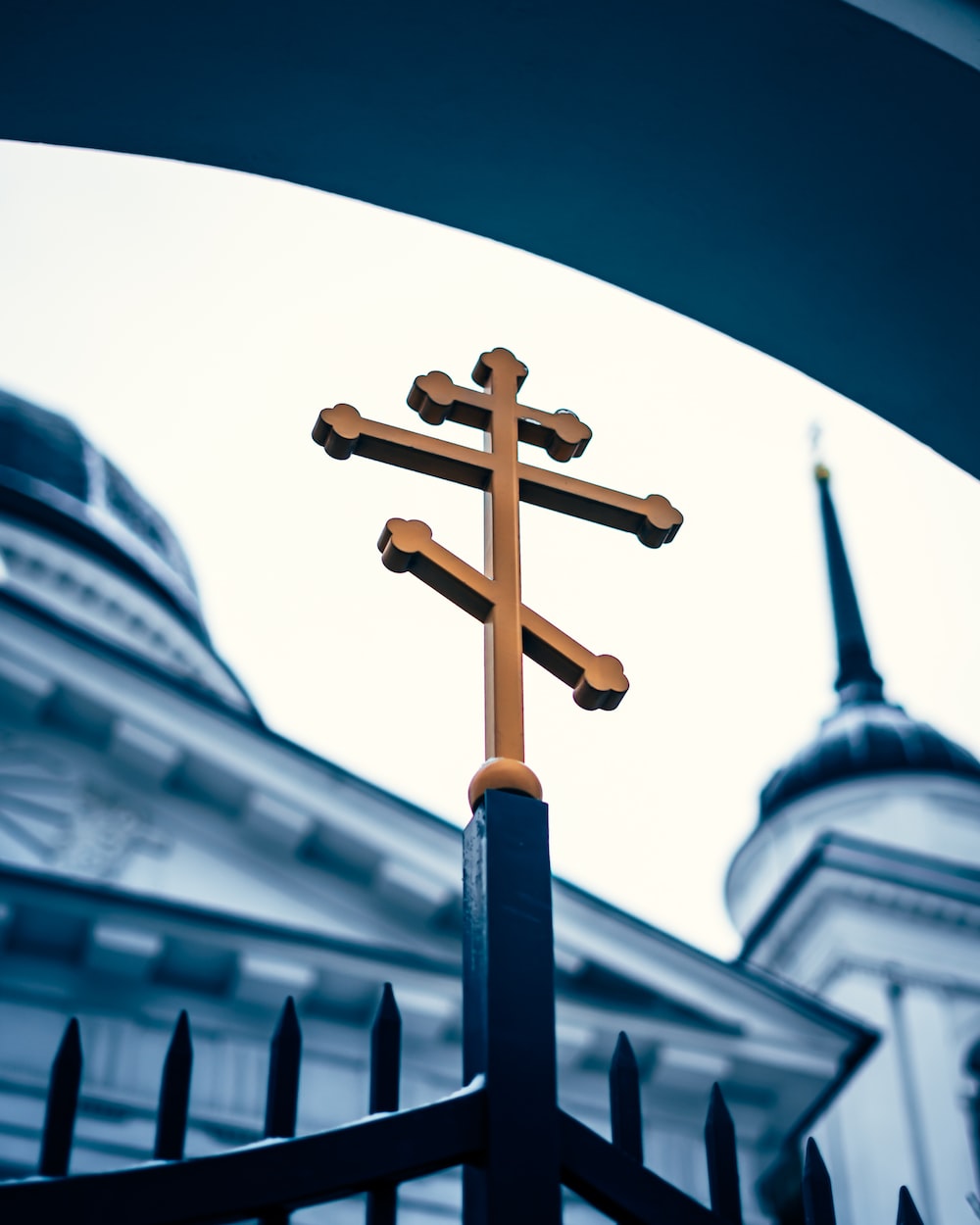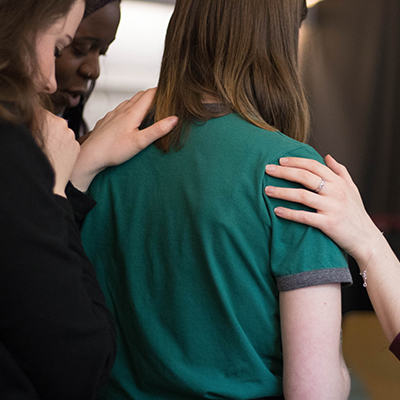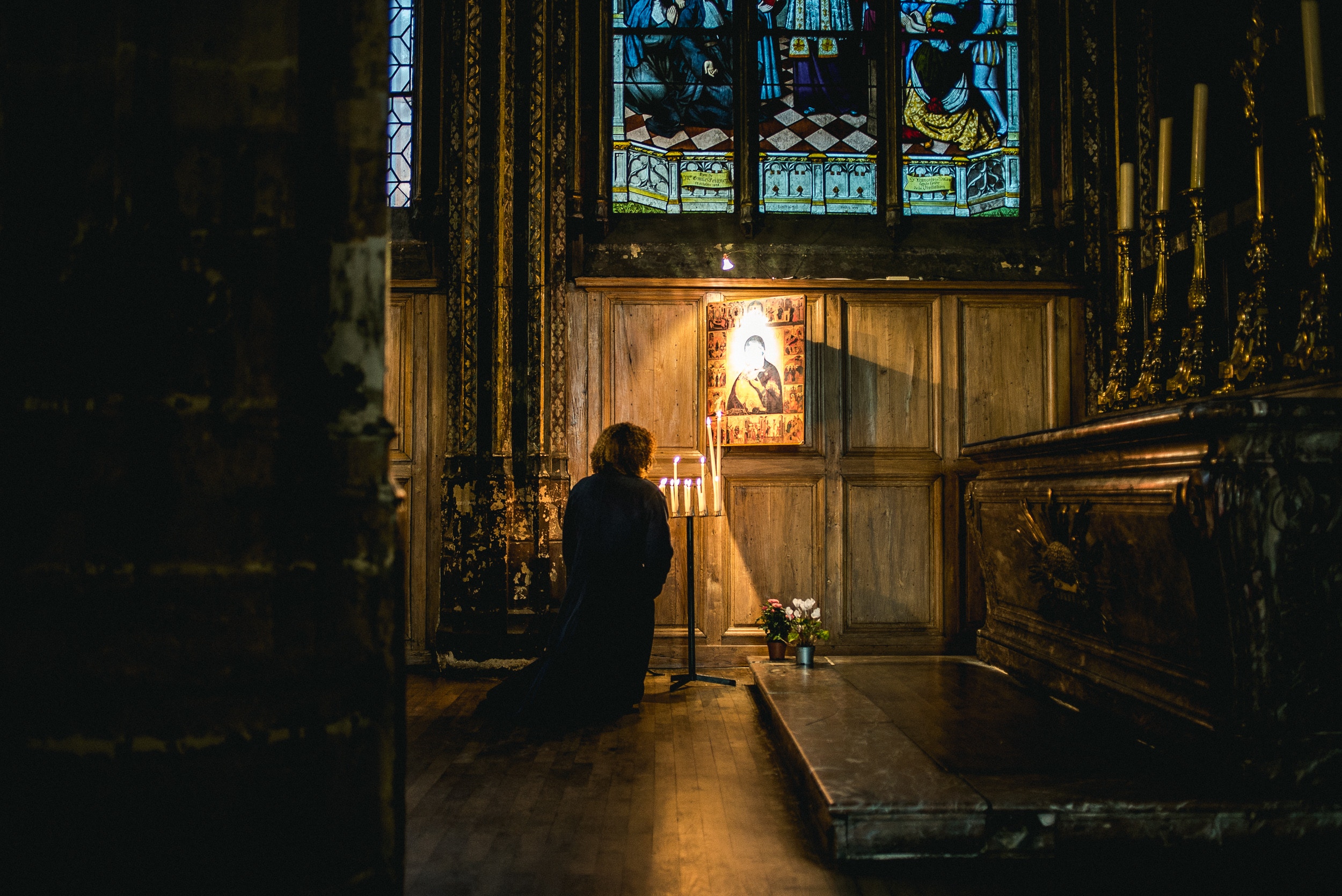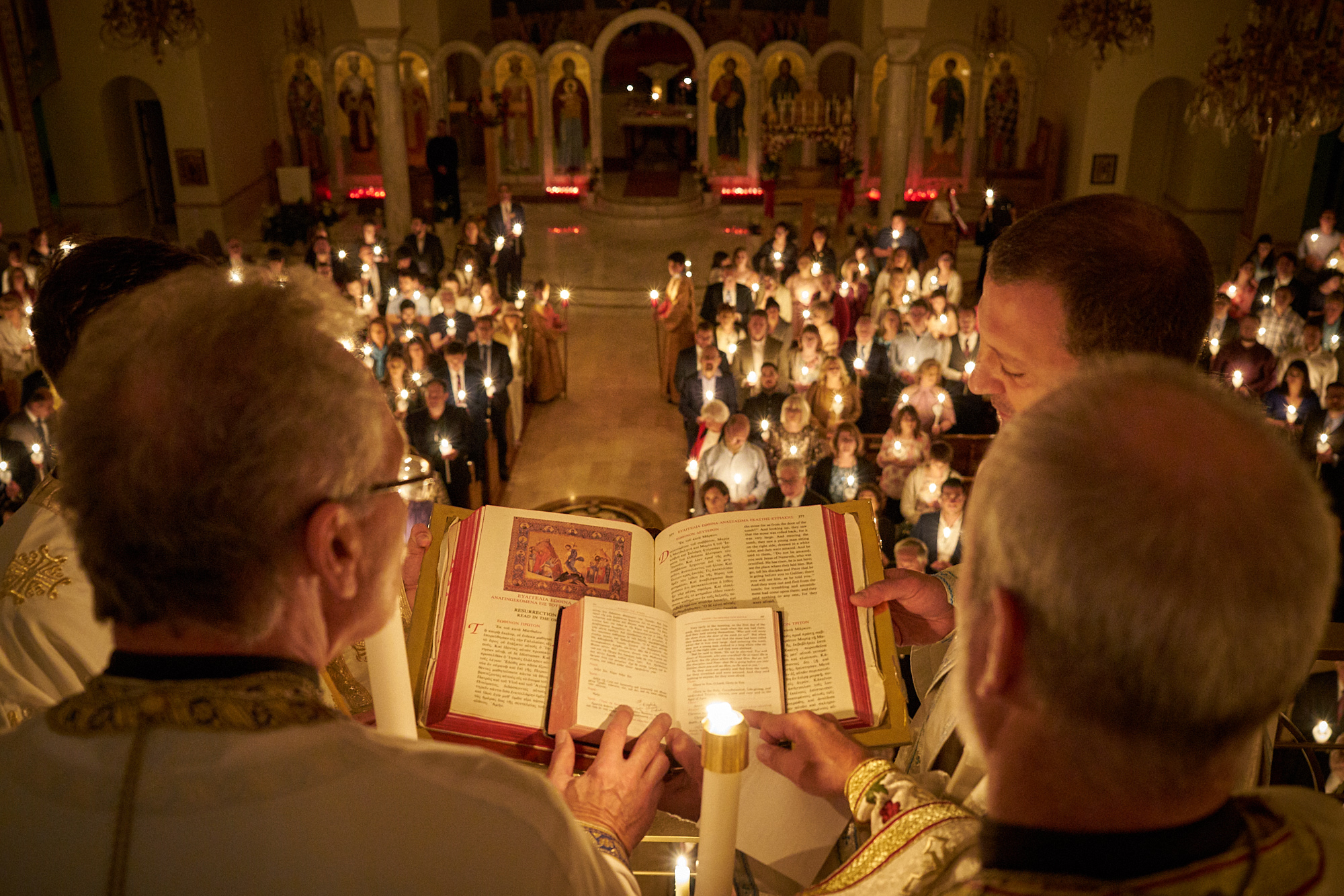Recently I received an email from someone who listens to the podcast version of Walking an Ancient Path. The listener wrote,
Thank you for hosting this podcast! I’ve been listening since last year this time. It’s been very helpful in navigating my personal questions and struggles. My husband would like to convert to Orthodoxy, and I’ve been “looking into it” for about 2 years now. My husband won’t convert unless I’m fully comfortable, and the priest we talk to supports us in taking our time (years, now), as well. I’m afraid, however, that even though my heart has softened quite a bit and I appreciate the Orthodox church much, much more than I did in the beginning, I just don’t know if I will ever land on fully desiring to convert. I am afraid I’d lose touch with the parts of “modern” Christianity that I love. (There are many things I don’t love about it anymore, but there are still things I do!) Do you have any advice on that? Thank you so much for any advice you have on this journey. I’ll keep listening!
I appreciate this listener for taking the time to write and especially for her honesty. Many of us have been where she is, feeling like we’re straddling two worlds, with one foot in our comfortable, familiar church experience and the other in the uncomfortable strangeness of Orthodox Christianity, which might or might not be our future.
If you’re there in that kinda-sorta-almost space, teetering on the cliff of the Orthodox Faith and not quite sure if you’re about to step into something wonderful or fall into the abyss, I hope my words in this post will help.
First of all, let me tell you what I’m not going to do: I’m not going to try to talk you into becoming Orthodox. I’m not going to tell you what to do, and I certainly won’t attempt to drag you kicking and screaming into the Church. I don’t have that right. But I do hope to encourage you to press on by sharing the many blessings of the Orthodox Christian life, which we’ll get to in a moment.

Orthodox theology has always respected the individual’s free will. I remember Fr. Andrew Stephen Damick talking in one of his podcasts about some seekers whom he had convinced of the truth of Orthodoxy. They then joined the Church, but more out of pressure than desire. A few years later, none of them were attending church.
Now, it’s possible that some readers might get mad at me for not hammering home the message that the Orthodox Christian Church is the one, true, apostolic Church. I believe this is true, and that the Church has the unbroken history, theology, and apostolic succession to back up this claim.
But, that might not be your most pressing concern. Reality can be messy. Some people must drive an hour to reach the Orthodox parish that is nearest to them, and, frankly, that parish might be quite insular and unwelcoming.
We cannot argue people into the Kingdom. We can’t even threaten people into the Kingdom. Orthodox Christianity, as Fr. Andrew has also noted, has a theology of where the Church is, but not a theology of where the Church is not. In other words, we don’t threaten people with hell, because God alone is the judge. As far as who’s in and who’s out of the Kingdom, the proper Orthodox response is, “We don’t know.” And we trust in a loving and merciful God who will sort everything out in the end.
The Church’s humility on this question actually drew me to the ancient Faith more than threats ever could. I remember sitting in my first Introduction to Orthodoxy class at a small OCA parish. I’m telling you, my guard was up. I wanted to learn, but I was suspicious—almost poised for a fight. I was prepared for the priest to say something to the effect of, “Well, all those other so-called ‘Christians’ are not real Christians.” I was prepared to get up and leave. I knew Christ, and I was certain—and still am—that my other Protestant friends know Christ as well.
Thank God that Fr. John didn’t say anything like that. He didn’t categorize who and who is not hell-bound. Instead, he said, “The Orthodox Church affirms all that God has done in your life so far. But . . . there’s more.” I relaxed at that moment, and I also thought, “That’s it! That’s what I want. More.”
So, if you’re in that in-between space, not yet Orthodox and not sure if you want to be, or if you’re already on the Orthodox path but having second thoughts about continuing, I get it. The struggle is real. So I think it might be helpful to address some common concerns about becoming Orthodox. I won’t even call them “fears,” although fear can be a problem too.

Actually, I think hesitating to convert to Orthodox Christianity is a good thing, because it means you’re really thinking. It means you are counting the cost. Because if your background is non-Christian, you’re facing the possibility of some radical changes in your lifestyle, your free time, your priorities, and the habits you cultivate. And if your background is heterodox Christian, you are looking at reexamining your beliefs, changing your worship experience, and changing your understanding and practice of your Christian faith. If you convert, you will even be adopting new terminology: Who else in the 21st century uses the quaint word “almsgiving” except the Orthodox? Or “theosis”?
Most importantly for all of us, regardless of background, becoming Orthodox requires us to humble ourselves. And then, living the Orthodox life, day in and day out, requires that we continue to humble ourselves. We confess our sins. We follow the Church’s calendar of feasts and fasts, regardless of personal convenience and emotional state. We submit to the Church’s authority in her teachings, worship, and biblical interpretation. It’s a lot to process.
My former priest said something very wise each time he taught an Introduction to Orthodoxy class. The classes were always a nice mix of inquirers and Orthodox people wanting some spiritual continuing education. Father Lou said to the newcomers, “Even if you never become Orthodox, you will be enriched by learning about the ancient Church, which is the root of all Christian churches.” And that’s true. The streams of Roman Catholicism and the various Protestant denominations find their source in the deep well of Orthodox Christianity.
Wherever you are in your journey so far, I pray that you have indeed been enriched by the depth and beauty of the Orthodox Christian Faith. And of course I do hope that you will make the plunge into the healing waters of the Faith. Whether or not that ever happens, let’s address three common worries about walking this ancient path. Then we’ll revisit them from a different perspective, considering the blessings in the midst of the difficulties.
Three Common Struggles with Becoming Orthodox
1. I will lose my community.
This is a serious concern for anyone who has been a part of a congregation for a long time. It’s especially difficult if one’s close friends and family members are a part of your church. Leaving that church to become Orthodox can result in hurt feelings and even anger. Not to mention a lifetime of stressful Thanksgiving dinners.

Others among us come from troubled families that are not close, or from good families who live hundreds of miles away. In cases like these, the local church functions as our family in ways that go way beyond the spiritual. The thought of losing regular contact with those who are dear to us can prompt us to press the “pause” button.
Of course, being baptized or chrismated into the Orthodox Faith does not mean that we cut ourselves off from our loved ones. But if we worshiped together in the past, our relationships will change. These brothers and sisters will not be part of our lives on a weekly basis.
And then there are family relationships to consider. I know married men and married women in my parish who attend church alone. Some of the absent spouses are not Christian; others are Christian but not interested in—or, worse, strongly opposed to—Orthodoxy. Such situations are painful and require great sensitivity and love. It is never right to pressure or judge one’s spouse who has rejected—at least right now—the ancient Church. But life can get lonely, especially if you are not free to share the things you are learning and experiencing through the Church.
When we become Orthodox, our worldview changes in so many ways, such as our understanding of spiritual authority, scriptural interpretation, even of who Jesus is and what his Incarnation, death, and Resurrection mean. As Dr. Jeannie Constantinou phrases this experience in her book as “thinking Orthodox.” Our experience of Christian community changes along with our hearts and minds. There are many positives with this reality, but contemplating all this feels like risk. And loss.
2. Orthodox worship is rigid and lacks freedom.
I’ve discussed this issue in several blog posts, and it’s a big one. We are shaped by our backgrounds and experiences, and accustomed to certain ways of doing things. And to step inside an Orthodox church, whether it’s our first experience of Christianity or not, is to step into another world. This is a spiritual truth, as we are entering into the ongoing heavenly worship with the liturgy. And the culture shock is real.

The music, which we discussed last time, was a genuine barrier for one of my sons. He had been involved in university choirs during his college years, and he loved the beauty of Western choral music—some experimental, some classical, and of course the many sacred songs from music history. He told our priest that he felt God’s presence in this music, and Fr. Lou very wisely encouraged him to continue singing and listening to it in his life outside of the church service—the “liturgy after the liturgy,” out in the world.
I was so impressed with the depth of the words of the Church’s hymns that I wasn’t as bothered by the unusual melodies. Something else felt more restrictive to me: the liturgical prayers. In my “Stumbling Stones on the Orthodox Road” series, I talked about my struggles with what I used to call “canned prayers.” Everything in Orthodox worship felt scripted, and it is. There is no ad-libbing, nothing spontaneous. Every aspect of the liturgy—the selected Scriptures, the prayers, the flow of the service, the movements of the clergy, even the architecture—has meaning and purpose.
It takes some getting used to. Now I understand that the Liturgy itself is inspired by, and filled with, the Holy Spirit. It is alive, powerful, and transformative. But for some, liturgical worship feels like dead religion, or quenching the Holy Spirit.
3. The demands of Orthodox Christianity seem legalistic.

I attended many churches that encouraged people to fast and pray, but nothing was as intense as the Orthodox Church’s approach. First of all, a vegan fast (plus shellfish) was completely new to me. I thought fasting always meant no solid foods. And the frequency of fasting days—basically a third of the year—felt daunting. On top of that, we fast together as a community on the days that the Church prescribes.
That can feel extremely limiting. What if I don’t feel like fasting? What if I want to do a liquids-only fast, or I want to fast for a specific reason that has nothing to do with the Church calendar? The Church seems to offer a bunch of rules and regulations rather than the leading of the Spirit. And then, after discovering that it’s okay to make adjustments to the fast in my own life, I’m told to get my priest’s blessing. What is this—a cult?
And then there are all the services, which multiply during Great Lent and other seasons, such as the Dormition fast. Especially for those of us who come from church backgrounds that basically operate like a self-serve buffet of doctrine and practice, the regimentation is strange. What about my personal needs? Everywhere I turn, the Orthodox Church seems bound by authoritarianism and legalism.
Going back to “me and Jesus” and choosing a church that feels like a “good fit” for my family seems a lot more inviting sometimes.
Over the years, I have seen people come to the Orthodox Church then leave because of reasons related to these struggles. So let’s look at these same three issues through a more positive lens. I believe we can find God’s blessings in the midst of these difficulties.

The Blessings in Becoming Orthodox
Addendum 1: I will lose my community.
But I will gain a different kind of community.

For those from a heterodox Christian background, the loss of a previous church home is a real source of grief. Folks from a secular background experience this loss too, in different ways. Maybe for years you went golfing with a group of buddies on Sunday morning. Some of your friendships may have revolved around bar-hopping and other activities that will soon feature prominently in confession with your priest.
Leaving behind some aspects of our past and joining an Orthodox parish takes commitment, and cultivating a sense of family takes time and patience. To complicate matters, after a season you may discover that you need to find another parish. Some Orthodox churches, to their great shame, are not friendly or welcoming. But in most places, if you will be patient and faithful, you will not only find community, but a community of a different quality than your past experience .
By “quality,” I don’t mean that Orthodox people are better than anyone else. Just one look in the mirror shows me that. In one of my earliest blog posts, “Coffee without Controversy,” I wrote about the difference in fellowship between previous churches and my parish. I realized this difference during coffee hour, after I had been attending the Divine Liturgy for many years. I’ll post my thoughts again here:
I noticed yet again that our after-church mingling feels different than even the warmest times of fellowship in my past Protestant days. But why?
Yes, the Liturgy was uplifting, filled with deep truths and symbolism that will take me a lifetime to unpack. But something else was different. I just couldn’t place it.
Suddenly the realization hit me.
In eleven years spent inside an Orthodox church, I [had] never once heard a theological debate.
Let me repeat that: not a single theological debate. In the context of my heterodox past, this reality is revolutionary and maybe just a little bit miraculous.
Lock any two Protestants in a room with their coffees, and they will argue over the number, preferred form, and meaning of the sacraments. Every. Single. One.
They will also debate End Times theology, the inerrancy of Scripture, proper biblical interpretation, and an unending list of recent trends. . . .
Lock two Orthodox in a room, and they will argue over church budget priorities, traffic flow during coffee hour, and whether or not the homily was too long. They will not argue over praying in tongues or the benefits of adding a drum kit to the choir loft.

There is a steadiness in Orthodox community because of the Church’s unchanging Faith. When doctrine is settled, we don’t have to waste energy in arguing and judging and evaluating each other’s personal faith, based on shifting criteria. Of course, Orthodox parishes are still filled with people. Some of us are annoying, temperamental, or rude. Some of us have nothing in common with each other except for the two most important things: Christ and His Church. But there is a peace that comes with practicing the unchanging Faith in a community.
Another important reason for this different quality of fellowship is that ours is a eucharistic community. Somehow, mystically, the Eucharist makes us one, in spite of our many failings. When we mingle at coffee hour, we are mingling as people who have received the Body and Blood of Christ from the chalice. The Eucharist is real, and it is powerful, and it is healing.
I can’t explain it. It’s not like we’re discussing the Eucharist during coffee hour. But in my previous churches, where each person believed something different about the bread and the wine—or the crackers and grape juice—unity was elusive. Sometimes we would be united, then things would fall apart. Even for people who are part of a church for the long haul, things change around them, from worship style to theological perspective.
And even though changes inevitably occur in any Orthodox parish, the Liturgy does not change. Doctrine does not change. And the Eucharist remains the Body and Blood of Christ, always. I think Jesus said it best:
“I do not pray for these alone [the disciples], but also for those who will believe in Me through their word [that’s us]; that they all may be one, as You, Father, are in Me, and I in You; that they also may be one in Us, that the world may believe that You sent Me. And the glory which You gave Me I have given them, that they may be one just as We are one: I in them, and You in Me; that they may be made perfect in one, and that the world may know that You have sent Me, and have loved them as You have loved Me.” (John 4:20–23)

There are even blessings to be found when a family is not united spiritually, including spouses who are not Orthodox or teenage children who want nothing to do with the Church. If the conflict is not resolved, we who are in the Church, or moving toward Orthodoxy, need to ask God to change us. If we are open, if we resist judgment and argument, we can learn patience, faithfulness, humility, and persistence in prayer within the family divide. We can learn to hold our tongues.
Saint Ambrose of Optina wrote,
Each of us must mainly take care for himself, for his own soul, for his personal spiritual welfare, because according to the Apostle, each of us must give an account for himself to God. Our confusion stems from the fact that we are inclined to educate others, and we try not only to persuade others, but also to dissuade, and to provide proof through various arguments.
Elder Thaddeus of Vitovnica also offers words of encouragement:
We can keep guard over the whole world by keeping guard over the atmosphere of heaven within us, for if we lose the Kingdom of Heaven, we will save neither ourselves nor others. He who has the Kingdom of God in himself will perceptibly pass it on to others. People will be attracted by the peace and warmth in us; they will want to be near us, and the atmosphere of heaven will gradually pass on to them. It is not even necessary to speak to people about this. The atmosphere of heaven will radiate from us even when we keep silence or talk about ordinary things.
Addendum 2: The worship is rigid and lacks freedom.
But liturgical worship provides spiritual formation.
This struggle with worship, like the struggle of embracing a new community, requires patience and faithful attendance. As I’ve written before, we need spiritual palate training. This is especially true if the only voluntary gatherings you’ve ever attended are sports events and concerts, where you go to watch your favorite athletes or performers. It is also true for those of us who are accustomed to churches that cater to our desires and feature music, preaching, and programs that are designed to be “relevant” and to offer emotional uplift. In both types of gatherings, we attend with the hope that we’ll “get something” out of the experience.

But the Orthodox Church is not interested in us “getting something” out of the worship. Instead, she provides the tools for theosis—to become like God and to be united with Him. The Church equips us for life in Christ. The Church prepares us for death. (Now there’s a slogan for a come-visit-our-church billboard that we’ll never see.) In the Divine Liturgy, we enter the ongoing heavenly worship. The Church invites us to join in, but she does not conform the services to our changing preferences.
Saint Justin Popovich wrote,
Every holy church is a piece of Heaven on earth. And when you’re in church, look—you’re already in Heaven. When the earth torments you with its hell, hurry to church, go inside, and behold—you have entered into Paradise. And if it happens that you are attacked by entire legions of demons, then run to church—stand among the holy angels, for the church is always full of angels, and the angels of God will protect you from every demon of this world. And nothing will be able to hurt you. Do not forget, brothers: We, Christians, are strong by God. Who then can be stronger than us? No one, no one!
But getting used to this is hard. Saint Maria of Paris, who died in the Ravensbruck concentration camp in Germany, used wonderfully blunt words about the Church:
It would be a great lie to tell searching souls: “Go to church, because there you will find peace.” The opposite is true. The Church tells those who are at peace and asleep: “Go to church, because there you will feel real anguish for your sins, for your perdition, for the world’s sins and perdition. There you will feel an unappeasable hunger for Christ’s truth. There, instead of becoming lukewarm, you will be set on fire; instead of pacified, you will become alarmed; instead of learning the wisdom of this world you will become fools for Christ.”
I struggled with what I perceived as the lack of freedom in the Divine Liturgy. Now I’m starting to understand that real freedom is found in freedom from my passions and my own self-will. In those early days as an inquirer, the Liturgy kept drawing me, but sometimes I would feel repelled and confused. One of the primary memories I carry from Orthodox worship back then is my jumble of emotions:
- I’m experiencing transcendent beauty here in the church. But dang, this service is long.
- The nave is never empty—I feel God’s presence and the presence of the saints and angels. But the icons are all so solemn.
- I’ve never felt such a sense of honor before—for God and for His Church. But my feet hurt from all the standing.
- Each hymn, each prayer gives me something to ponder and pray about. But everything is so scripted.
- Man, this is like drinking from a firehose. And . . . I’m hungry.
Addendum 3: The demands of Orthodox Christianity seem legalistic.
But when we fast, pray, give, and attend services—no matter how imperfectly—we find healing.
By walking this ancient path, we conquer our passions. We orient our lives toward Christ and His Church. We crucify our pride when we follow the Church’s guidance rather than doing things our own way. We learn to trust God to work in us through His Church.
Slowly, slowly, as we participate—and Orthodoxy is useless without Orthopraxy—we begin to change, by the grace of God. We fast, and slowly we gain victory over sins and habits that have nothing to do with food. We gain power to say no to ourselves and yes to God.
We pray the Church’s written prayers, and they become part of us. They guide our thinking and our understanding about God, the world, and ourselves. And slowly we learn to pray, really pray, along with these tried-and-true, Spirit-filled words.
In becoming Orthodox, we begin to conform our lives to the Church’s rhythms and, yes, her demands. We stumble and fall, and we get up again, as our prostrations illustrate. As we orient ourselves to the Church’s true North, something clicks, and we find that we want to be at our parishes. We want to enter the temple to pray on days other than Sunday, because it is a holy place.

I’m telling you these things from my own experience as well as the experience of others. And not just my fellow parishioners, but our brothers and sisters in Christ across the ages. Becoming an Orthodox Christian, or returning to your Orthodox faith, can be a bumpy road. Some people discover, learn, and grow in the Faith by receiving it with a beautiful simplicity. I envy them. I seem wired to analyze, question, struggle, and question some more.
For you kinda-sorta-almost people, I can’t tell you what to do. But I will tell you that the journey to the Orthodox Faith, the experience of walking an ancient path, has absolutely been worth the struggle in my life. I already knew Christ when I encountered the ancient Church, and I have grown to know Him and love Him more deeply. I have greater inner peace and spiritual stability because the Orthodox Church has laid out the path to healing in Christ, and hopefully some theosis is occurring along the way.
I hope we can all journey together in the Church. But no matter where you are, or where you end up, I pray that you may be blessed, that you may know Christ more deeply, and that your encounter with Orthodox Christianity will continue to enrich your life.
***
Our next blog post will be a little different. I will interview my husband Rob, and we’ll talk together about our own bumpy journey into the Orthodox Church. I was willing to put up with all the strangeness in order to be a part of the ancient Church. He thought maybe Anglicanism would be a nice compromise, with liturgical worship but not all the formality. I was ready to convert two years before he was. We had teenagers.
Lord, have mercy.
But God was with us through all the speed bumps, just as He is with you, wherever you are on your spiritual journey. I hope you can join us.
Very thoughtful and gracious considerations! They are much appreciated.
In addendum 2, I believe you meant to write the following:
“I those early days as an inquirer, the Liturgy kept drawing me” would be “In those early days”
“Man, this is like drinking from a firehouse” would be “drinking from a firehose”
“One of the primary memories I carry fromOrthodox worship” would have a space between “from” and “Orthodox”
(Forgive my grammar policing)
Ack! “Firehouse.” I think I fixed everything. Thanks for the final proofreading! 🙂
Thanks for writing this. Over the past couple years I’ve found myself drawn to Orthodox Christianity in a way I’ve never felt drawn to any church. I’ve lived sort of in the orbit of Christianity, shaped by it culturally for sure but never in a deliberate way. And my ancestral past feels very complicated, a jumble of stories from rebels and refugees. People talk about being a “None” (no religion) but my background feels more like several glass jigsaw puzzles shattered and then mixed together. I grew up with the secular doctrine of “you can be anything you want!” and the less openly stated “you can belong anywhere you want.” I don’t think it’s that simple anymore.
And of course, I’m in mid life and embedded in family….which is great but also means I hesitate to to drastically change our daily routines or to leave my family alone for hours….I know I could in theory but I feel a lot of guilt and anxiety if I can’t convince them to come along on this journey with me, and I also feel like the last person qualified to convince anyone of anything (see reasons above lol).
Anyway. When I try to think too much about these things, I feel overwhelmed and like I might as well give up and just hide somewhere. (Except nowhere to hide.) So I just hope with small efforts and connections every day I’ll see some way forward, wherever that is.
Thank you so much for commenting again, Siochana. Continue turning to Christ for guidance, and remember that God knows your struggle. (I tend to forget that when I’m full or worries and ponderings.)
Lynette,
Your posts are always so well balanced, researched, thoughtful, gracious and grounded in the faith! I greatly appreciate what you put out, I’m sure it’s not easy. Please know there are plenty of readers/listeners out there benefiting from your work, even if we don’t always comment. May God continue to bless your ministry.
Thank you, Father, for your encouragement. 🙂
Yes, I concur completely being on this “bumpy” path for a few years now. May God continue to use you both to give valuable insight to others like me who desperately need it, thanks.
Lynnette,
Your commentary really hits home for me personally. I was blessed to be born into two religions. My father orthodox and my mother catholic. I am the only on of five siblings that follow the orthodox faith while my brother and sisters practiced the catholic faith for a while and then have all stopped attending any church services. Growing up it was never a decisive issue in the family but now with both my parents gone I feel quite alone at times. My parish orthodox parish has numerous converts who seem to be stuck in between religions. Never completely converted. My advise to them is converting is like learning a new language, you have to learn to “think” in the new language and not just translate each word in your head from your old language before speaking. It seems to help some folks. Love your outlook and perspective. God Bless.
Thank you for sharing! 🙂